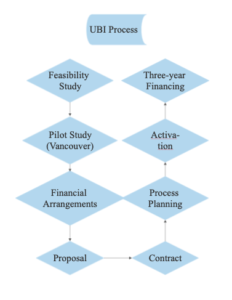 I find myself in the evenings taking a process and walking through it, as preparation for starting the Michaelangelo Fund after the Reval.
I find myself in the evenings taking a process and walking through it, as preparation for starting the Michaelangelo Fund after the Reval.
Last night I began to map out the UBI (universal basic income) contractual process – not like I know anything about it. I don’t.
I did work for a proposal group in a large engineering firm. I also worked for configuration management in a large software company. And I was a business writer and foundation grant writer.
I have a little background, not much. Very general.
But it doesn’t matter. All I’m doing is getting my mind working on the situations I’ll meet later.
I’m probably not the one who’ll come up with the solutions. But it helps to have an idea of what’s occurring.
In a general way, I feel the need to exercise my mind and learn how to think about the matters I’ll encounter later on. So last night it was the UBI process.
I started with a feasibility study – can we do it and what would it take?
Given that I’ve already by now started the Vancouver Project, which is about creating a model city on Canada’s West Coast, (1) I can use the Greater Vancouver Regional District to test out best UBI practices. And out of this test run we can also discover the impact on people of entering a UBI era.
We’ve seen the dire social impact of automation. Now it’s time to try the uplifting impact of a UBI.
With what we learn in Vancouver, we can now estimate total costs and put that amount in escrow.
We can next make a proposal to the Canadian government for a UBI.
Then the Canadian government begins the mapping out of how to deliver the funds to the people. Through Revenue Canada? Through the Post Office? By what mechanism? And who keeps track? Who sees that corruption does not set in? And who are “the people”?
After negotiations we’ll sign a contract.
Then, we activate the program – enough funds delivered to the Canadian government for a monthly payment of $102,000/12 = $8,500 a month to each adult Canadian; $2,550 to each Canadian child.
Michael has asked that enough funding be put away in escrow to run the program for three years, before the Canadian government is invited to take it over.
We also discussed the fact that NESARA will or may come before that (it’s a matter of vibration, not timing). Because of that I’ll keep the money for future years with any one UBI program with the MF in escrow.
Also, he’s warned that any program we devise will expand. I’ll be putting an additional 30% aside to account for program add-ons and expansions in scope.
Michael advised me to start at home:
“Begin at home and get your feet wet. Begin with the disenfranchised adults, women, then men, then children – because the children will benefit right off the bat regardless – and then extend yourself to what you have thought of as the marginalized populations – yes criminals, those who have been locked up because people label them mentally ill. Then spread your wings across the globe.” (2)
Another reason for starting locally:
“Think of it in this way, both for you, for your team, for the organization and for the planet, you need a few wins under your belt.” (3)
Nothing would be more deflating than beginning a process in a country halfway around the globe, where languages and customs differ, and finding ourselves in hot water. I plan to get some experience at home first.
Each time I take a piece of the puzzle like this and “wrap my arms around it,” as a former boss would say, I feel renewed confidence in my ability to do this work. Since we’ll be hosting UBIs in multiple countries, and venturing into new territory as we do, I need to feel confident.
Automation was supposed to give us a life of leisure. Instead, applied in a careless and destructive manner, it robbed us of pensions, benefits, decent salaries, and finally jobs. Now, through other humane means, we provide ourselves with the acceptable lifestyle we dreamed of back then.
Footnotes
(1) I acknowledge that, in many ways, Victoria, B.C., is already a model city.
(2) Archangel Michael in a personal reading with Steve Beckow through Linda Dillon, Aug. 6, 2013.
(3) Ibid., Oct. 18, 2017.

